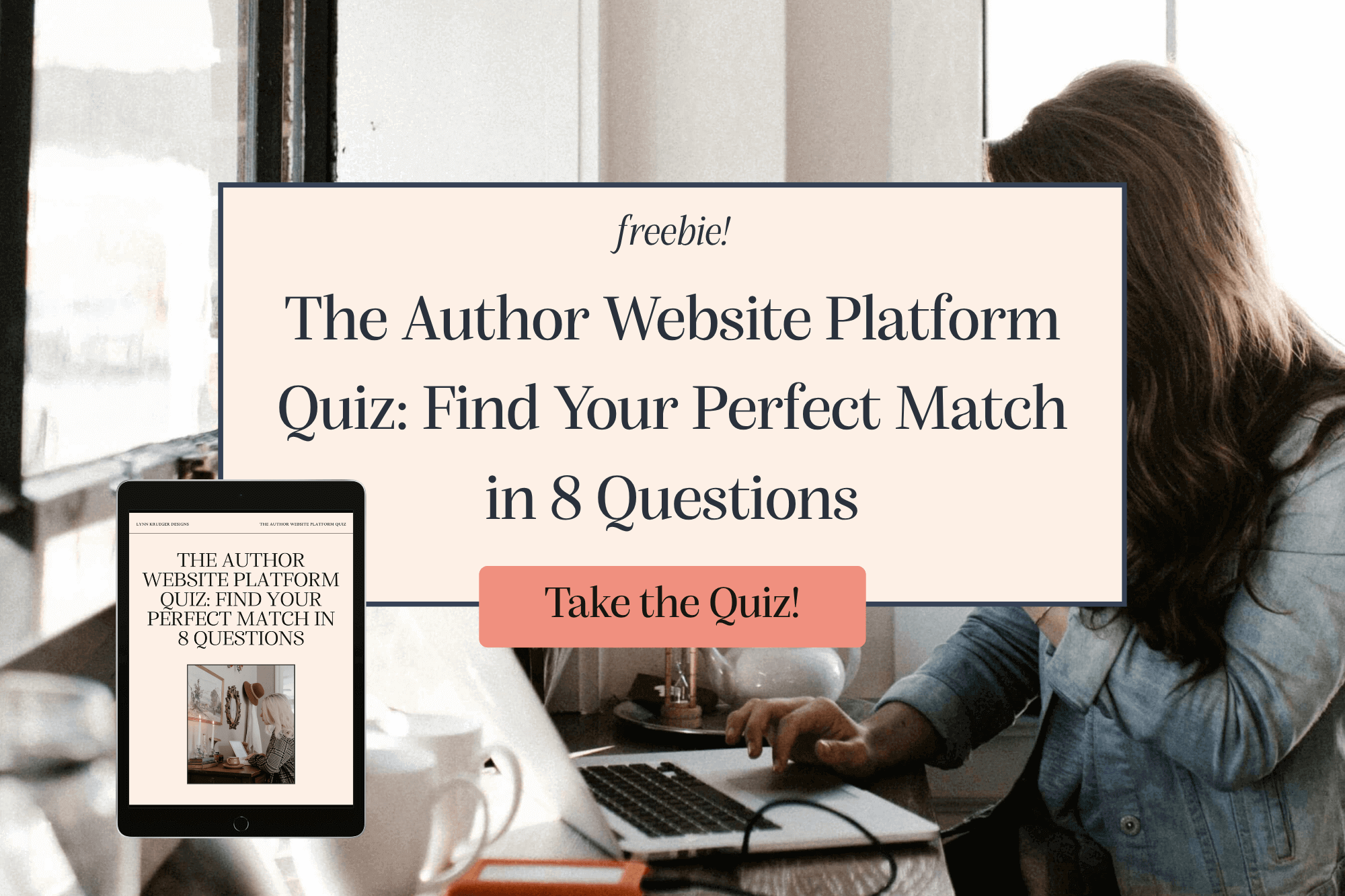The Author Website CTA That Actually Converts (Hint: It's Not "Subscribe")
Calls to Action
Most author websites have terrible calls-to-action (CTA).
A call to action is anywhere that you ask a website visitor to do something. It could be scheduling a free consult call, purchasing something, or—as explored in this article—asking web visitors to subscribe to your newsletter.
You've seen CTAs everywhere—those boring "Subscribe to my newsletter" buttons that sit there like digital tumbleweeds, ignored by 90% of visitors.
Meanwhile, smart authors are using CTAs that convert at rates 161% higher than generic ones.
The difference? They're not asking people to "subscribe." They're offering something irresistible in exchange for an email address.
Why "Subscribe to My Newsletter" Kills Conversions
The Fatal Flaw of Generic CTAs
Asking someone to "subscribe" is asking them to commit to a relationship before they know you.
It's like proposing marriage on the first date.
The problem with "Subscribe":
It focuses on what YOU want, not what THEY get
It promises ongoing obligation without a clear benefit
It sounds like work (who wants another email to read?)
It doesn't create urgency or desire
What Readers Are Really Thinking
When a visitor sees "Subscribe to my newsletter," here's their internal monologue:
"What's in this newsletter? How often will you email me? Will it be useful or just book sales pitches? Do I really need another email cluttering my inbox?"
The result? They leave without signing up.
But when they see "Get the free bonus chapter that didn't make it into the book"—suddenly they're interested.
Not convinced you need an email list as an author? Read the previous article, “Why Every Author Needs an Email List (And How Your Website Can Build It)” to learn more about how an email list can empower you.
The Author CTA Formula That Actually Works
The Psychology of High-Converting CTAs
Using a specific, clear CTA can increase conversion rates by 161% compared to generic requests.
Successful author CTAs follow a simple formula:
Clear Value + Immediate Benefit + Specific Outcome = High Conversion.
Instead of: "Subscribe to my newsletter," try: "Get the secret character backstory that reveals who the killer really is."
Instead of: "Join my mailing list," try: "Download the free writing toolkit that helped me get my first book deal."
One is about you, the other is about them.
Be honest: which one makes you want to sign up?
The Lead Magnet Effect
48% of consumers happily give their email address to receive a discount.
Authors have something even better than discounts—exclusive content.
Some high-converting author lead magnets include:
Bonus chapters that expand the story
Character interviews revealing hidden backstories
Deleted scenes that didn't make the final cut
Behind-the-scenes content about your writing process
Free short stories set in the same world
Writing guides from your expertise
Exclusive early access to cover reveals or excerpts
Author CTA Examples That Convert
Here are some ideas for CTAs that readers will be excited to sign up for, to get your own creative juices flowing.
Fiction Authors: Story-Driven Lead Magnets
Romance Author CTA: "Get the steamy deleted scene that was too hot for the final book." This creates curiosity and promises exclusive content.
Fantasy Author CTA: "Download the free worldbuilding guide with maps and histories that didn't fit in the novel". This appeals to fans who want to go deeper into the fictional world.
Mystery/Thriller Author CTA: "Read the bonus chapter that reveals what happened to the suspect who disappeared." This leverages the genre's core appeal—solving puzzles and uncovering secrets.
Non-Fiction Authors: Problem-Solution Lead Magnets
Business Book Author CTA: "Get the free spreadsheet template that helped me track my way to seven figures." This offers a specific tool with quantified results.
Self-Help Author CTA: "Download the 21-day challenge workbook that 10,000+ readers used to transform their mindset." This provides a clear timeframe, social proof, and transformation promise.
How-To Author CTA: "Access the step-by-step video tutorial that shows you exactly how I do [specific technique]." This offers visual learning format with specificity.
General Author CTAs That Work Across Genres
Writing Process Appeal: "See the exact outline method I use to write a book in 90 days."
Industry Insights: "Get the publishing guide that helped me land my first book deal."
Community Building: "Join 5,000+ readers who get my monthly behind-the-scenes writing updates".
Early Access: "Be the first to read Chapter 1 of my upcoming book (3 months before release)."
The Science of CTA Placement and Design
Great, now you have an idea for a high-value CTA! But did you know that how you design your CTA is as important as what it offers?
Design Elements That Boost Conversions
Red CTAs outperform green CTAs by 21% in many tests, likely due to urgency and action associations.
Increasing CTA button size can increase click-through rates by 90%.
White space around CTAs improves conversion rates by 232% by reducing visual clutter and making the CTA stand out.
Mobile optimization can improve conversion rates by 32.5%—crucial since many readers browse on phones.
The Power of Urgency and Scarcity
Adding urgency to CTAs can increase conversion rates by 332%.
Author-friendly urgency tactics could include:
"Download before my publisher makes me take it down."
"Only 100 copies of the signed edition are available."
"Get early access—doors close in 3 days."
"Free for the first 500 readers only."
But use urgency ethically—false scarcity damages reader trust.
Lead Magnet Quality: What Actually Gets Downloaded
The Lead Magnet Consumption Problem
Of 1,000 people who download a lead magnet, only about 100 actually consume it.
Create lead magnets so compelling that readers can't help but consume them immediately.
High-Consumption Lead Magnet Formats
Short-form content outperforms long-form:
73% say short-form video content (clips/tutorials) drives higher consumption than long-form
58.6% report checklists, toolkits, or newsletter snippets convert better than lengthy content
Video clips achieve 55.7% conversion rates among short-form formats
For authors, this means:
5-minute "writing tip" videos perform better than hour-long masterclasses
One-page character sheets get more engagement than 20-page worldbuilding guides
Quick reading guides convert better than comprehensive analyses
Interactive Lead Magnets That Work for Authors
Interactive content generates 2x more engagement than static content.
Author-friendly interactive lead magnets:
Character personality quizzes ("Which character from my series are you?")
Writing style assessments ("What's your writing personality?")
Genre recommendation tools ("Find your next favorite book based on your preferences")
Plot twist generators (for writers in your audience)
They provide immediate entertainment value while collecting valuable data about your audience.
The Author Website CTA Strategy
Single vs. Multiple CTAs
Landing pages with a single call-to-action can increase conversions by 371%.
For author websites, this means:
One primary CTA per page (usually your best lead magnet)
Secondary CTAs should support the primary goal, not compete with it
Navigation CTAs (like "Books" or "About") are functional, not conversion-focused
Common Author CTA Mistakes (And How to Fix Them)
Mistake #1: Focusing on Features Instead of Benefits
Wrong: "Subscribe to get monthly writing updates."
Right: "Get the monthly email that shows you exactly how I research, plot, and write bestselling novels."
Always lead with what value the reader gets.
Mistake #2: Being Vague About the Offer
Wrong: "Get exclusive content."
Right: "Download the 10-page character guide that reveals the secret histories of every main character."
Specificity sells—make it clear exactly what they're getting.
Mistake #3: Creating Weak Lead Magnets
Common weak magnets:
Generic writing tips that are available everywhere
Outdated content that doesn't reflect your current work
Lead magnets that don't relate to your books
Content that takes 30 seconds to consume
Strong alternatives:
Unique insights from your specific writing journey
Fresh content that complements your latest work
Substantial value that takes 10-15 minutes to consume
Actionable tools readers can use immediately
Mistake #4: Not Following Up Effectively
Getting the email address is just the beginning. After someone downloads your lead magnet:
Deliver immediately with a compelling subject line.
Follow up within 3 days with related content.
Share your author story to build connection.
Provide consistent value before making any sales pitches.
Seasonal and Book Launch CTA Strategies
During book launches:
Pre-launch: "Read the end-of-book bonus chapter three months before anyone else."
Launch week: "Get the launch week bonus pack with deleted scenes and character interviews."
Post-launch: "Access the book club discussion guide and behind-the-scenes content."
Holiday seasons:
Gift-giving seasons: "Get the gift guide for readers in your life."
New Year: "Download the reading challenge that will transform your year."
Summer: "Get the beach reading recommendations from [genre] author."
Your Next Steps: Creating CTAs That Convert
The Author CTA Audit
Look at your current website and ask:
What are you asking visitors to do? (If it's just "subscribe," you need to change this.)
What value are you offering in exchange? (If it's unclear, visitors won't convert.)
Is your offer specific and compelling? (Vague offers get ignored.)
Does your CTA stand out visually? (Buried CTAs don't get clicked!)
Creating Your First High-Converting Author CTA
Step 1: Identify your most compelling content idea
What's your readers' biggest question about your books/writing?
What bonus content would fans of your genre love?
What behind-the-scenes content could you share?
Step 2: Create the lead magnet
Keep it substantial but consumable (10-15 minutes of value)
Make it visually appealing and professionally formatted
Ensure it delivers on your CTA promise
Step 3: Write your CTA copy
Lead with the benefit, not the ask
Be specific about what they get
Use action-oriented language
Create appropriate urgency (if genuine)
Step 4: Design and place strategically
Make it visually distinct from other page elements
Place it where attention naturally flows
Test on mobile devices
Ensure fast loading times
The best CTA is one that provides immediate value to your readers while building your email list.
When you solve their problems or provide genuine value upfront, they'll be excited to hear about your books later.











